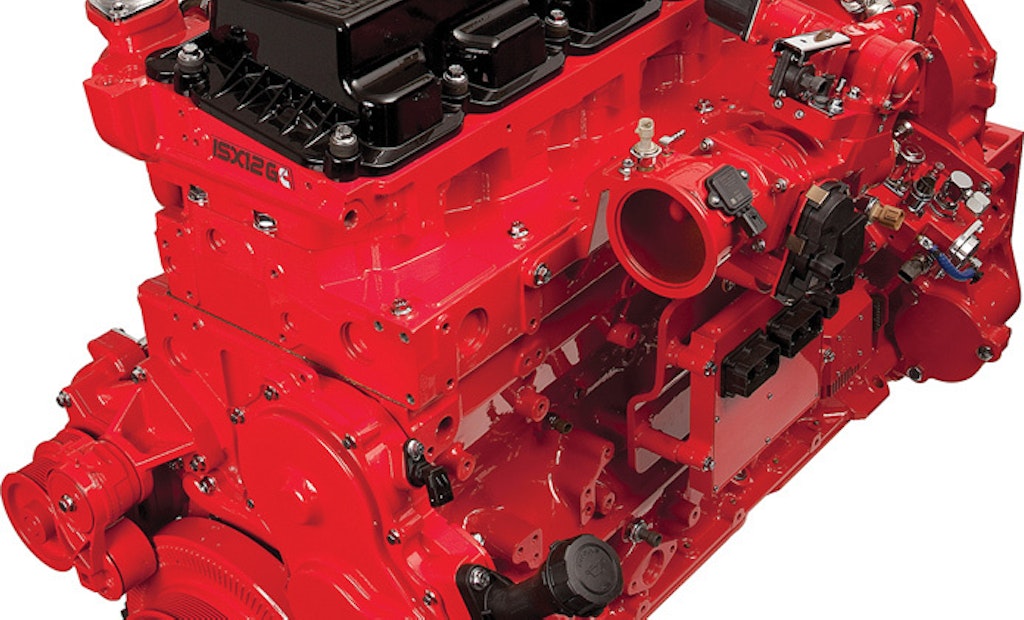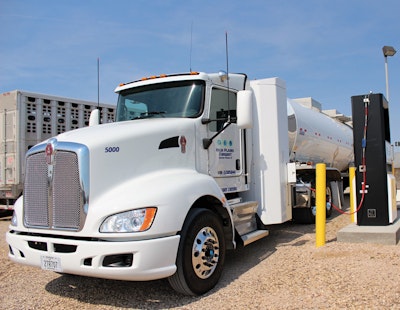
The next time you buy a dump truck or equipment-hauling medium-duty flatbed or semi tractor-trailer, will you be sticking with tried and true diesel engine technology or looking toward an emerging natural gas-powered rig?
A lot of factors should go into your choice of a familiar diesel system – which comes with the drawbacks of more pain at the pump and high-maintenance emissions components – or to become an early adopter to a technology using a now-abundant North American fuel source.
A significant number of small-business fleet owners are sitting on a parking lot of aging on-the-road vehicles. Conservative company owners who run work trucks hard and use them every day may have put off new truck purchases after the 2007 and 2010 changes to emissions systems. And they may have stayed out of showrooms as the economy has started its recovery.
But now, many of those work trucks are at or past their end-of-life date and need to be replaced. And as contractor companies are getting busier with infrastructure work and the economic upswing, the last thing they want is to have crews idled by breakdowns involving older trucks.
NO FOREIGN OIL
Many American business owners like the idea of using domestic energy supplies to power their fleets and reduce the nation’s reliance on foreign oil. And if those same business owners could save on fuel bills, while eliminating the problematic maintenance of emissions equipment on their diesel trucks, they’ll start to take notice of natural gas.
Oklahoma-based Seaboard Foods and its subsidiary, High Plains Bioenergy, just invested in a natural gas fleet of Kenworth trucks to transport its B99 biodiesel product and live hogs to its food processing plant. The company purchased two Kenworth T660 trucks with Cummins Westport ISX12 G heavy-duty natural gas engines for the biodiesel transport and 43 T800 short hood day cabs using the same powerplant for hauling animals.
“We see adding CNG-powered Kenworth trucks as a great opportunity to further our commitment to sustainability and environmental stewardship,” Terry Holton, president and CEO of Seaboard Foods, says. “The availability of a 12-liter natural gas engine really makes it possible for our operation to run CNG-powered trucks because it provides the right amount of power and torque for the loads our trucks carry.”
According to the U.S. Department of Energy, 112,000 vehicles are powered by natural gas in this country, and 14.8 million worldwide. According to the Department’s Alternative Fuels Data Center, CNG is best for high-mileage vehicles that operate in a limited territory. The LNG options are better for vehicles that have longer hauls, according to the Department.
In the LNG technology, gas is cooled to a cryogenic state, at -260 degrees F, changing it from a gas to a liquid. The fuel is kept in liquid state in big, dual-walled stainless steel tanks until it’s conveyed to the engine for burning. In CNG technology, natural gas is kept at 3,500 psi in storage tanks until it’s fed into the engine. Storing either fuel on the truck requires expensive tankage.
LOCAL, REGIONAL
Whether these engines make sense for your business depends on a variety of factors, according to Andy Douglas, Kenworth’s national sales manager.
“Everything to date has been more local and regional haul,’’ Douglas says. “The long-haul side of things is still awaiting the maturing of the fueling infrastructure.’’
Kenworth offers three new Cummins Westport engine choices fueled by natural gas: the ISX 9 liter, the ISX 12 liter being used by Seaboard Foods, and a 15 liter, which is essentially an ISX powerplant modified to allow a small amount of diesel fuel to be mixed with the natural gas. One huge benefit to the 9-liter and 12-liter models is that diesel emissions equipment is eliminated, a prospect that appeals to truck owners, Douglas says.
“You don’t have the diesel emissions system to maintain, and cleaning the filters and replacement. When you tell [truck buyers] that, their eyes get huge,’’ he says. “You’ve got their attention when you start talking about diesel emissions.’’
Here are a few questions to help you determine if your business is a good candidate for using a natural gas-fueled truck:
Do you have established fueling stations in your area?
The infrastructure of fast-fill natural gas fueling stations necessary for these trucks is in its infancy, but there are areas of the country where it’s better established. Check around your shop location and the areas where you drive most to see if you’d have access to enough fuel stations to make the conversion practical. Keep in mind that if natural gas trucks grow in popularity, fueling stations should proliferate as well. So even if natural gas doesn’t seem to be the best option for you today, it might make more sense down the road.
Do you put on enough miles to maximize fuel savings?
With diesel prices hovering around $4 per gallon, you could expect to save about 25 percent or more on fuel costs going with natural gas. While 80 percent of the diesel and natural gas engine componentry is identical, the fuel storage and delivery systems in natural gas trucks drive the cost of the trucks up. Douglas was hesitant to give examples because every truck specification will be different, but you’ll have to consider whether you’ll be dollars ahead going with the more expensive new technology offset by lower fuel costs. Another thing to consider is whether you think the price of diesel fuel will continue to rise and if natural gas will continue to be a cheaper alternative.
Will your truck have enough room for the expanded tankage?
Fuel tankage takes up significantly more space on natural gas-powered rigs. According to Douglas, tanks for LNG engines take up twice the amount of space as diesel fuel tanks, and tanks for CNG engines take up four times as much space as traditional diesel tanks. Like diesel trucks, these tanks can be mounted on the frame rail, but they can also be installed behind the cab. So there is some flexibility on installation depending on how you use your trucks.
Does your state offer incentives for conversion?
The federal government at one time offered attractive incentives for truck buyers to switch to natural gas, but that went away a few years ago, according to Douglas. But he says a number of states, including California, Oklahoma, Pennsylvania and Texas, continue to offer grants and rebates for upgrading to natural gas trucks. To search the incentives offered in each state, check out the U.S. Department of Energy website: www.afdc.energy.gov.
Are you more comfortable with the old reliable diesel?
Many truck buyers will want to stick with the technology they know best, and that’s OK. Douglas says manufacturers continue to improve diesel technology to make the engines more efficient and reduce pollution. “Diesel is not going anywhere,’’ he says. “But for certain segments of our industry and applications, natural gas may be an alternative that people will be considering.’’
Another option is hybrid technology, combining a diesel engine and electric motor to save fuel. This option makes sense for trucks working in a lot of stop-and-go traffic; for example, Coca-Cola uses 700 medium-duty delivery trucks using hybrid Kenworth engines. Some companies weigh the potential benefits of being early adopters to technology and make the jump.
NATURAL GAS OUTLOOK
Douglas says the impact of natural gas on heavy-duty trucks is going to be profound.
“Natural gas today is such a huge game changer for North America,’’ he says. “This resource, for the most part, is something that wasn’t fully realized until the last few years. The magnitude is significant and the price associated with it is very good, too. It’s a cheap and abundant fuel source that works well in heavy trucks.’’






